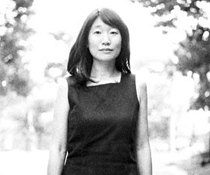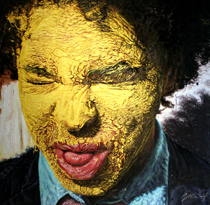Pages: 1 2
A.E.: And identity. You have been asked a lot in Europe – and even in Quebec: ‘where are you from?’ Is the idea of origins and roots, nationalism over-emphasised in today’s world? Lets think multiculturalism, and of Canada as model.
M.T.: Migration is something I’ve always been fascinated by. The movement of people is as old as human history; I think we could even argue that migration is human history. Every generation of my family has, as far as I know, a history of moving, whether it be internal migration in China, or across the seas to Malaysia, Australia, the United States, England, Poland, or Canada. People move in search of resources and livelihood; the current generation of my family is lucky because they’ve been able to immigrate as skilled workers, researchers and professionals. In earlier generations, they migrated, or fled, because of poverty. In the end, I think it would be hard, and perhaps unnecessary, to definitively categorize their origins. I feel that my home is Canada, but also feel that my roots stretch in many directions. They go back much further than I could ever see, and they are never a straight line. I took part in this wonderful DNA project with National Geographic, and found that my ancestors left Africa 60,000 years ago, and one branch is believed to have settled in Australia; another branch eventually crossed the Bering Strait and became some of the first peoples of North America. Meanwhile, others went through India to present-day Vietnam, Cambodia, Laos and China. When I was growing up, we moved houses almost every two years. Each time, my parents hoped the new apartment would bring good luck or changed fortune. It didn’t, but the motion of moving, the hopefulness and the yearning of it, has stayed with me.
A.E.: In an interview with Ian McGills you responded to a question in these words: “The idea that we don’t rely on altruism but choose to be altruistic might take us farther than simply believing that we’re naturally good.†The context is your sensitive treatment of war and trauma in Certainty, your second novel. The 18th century Philosopher Jean-Jacques Rousseau, considers the idea of original goodness an illusion. Is this pessimistic?
M.T.: No, I don’t think this is pessimistic; and in a way, maybe optimism and pessimism aren’t the most useful ways of looking at our natures. Self-interest, for individuals and groups, exists and is persuasive. If we knew this fact (innate selfishness rather than original goodness), and chose to work against it, would our actions change? I do think that if we didn’t see ourselves as elevated or chosen or set apart on this planet, we’d be better creatures.
A.E.: Lets us look at the idea of the writer as an altruistic figure in modern society, mapping for us human foibles and how to better negotiate it; in that case would you consider writing an altruistic act?
M.T.: I come from a family where the stories were hidden and so I’m curious about what gets articulated: how stories are told, how they’re read and interpreted, how they get lost and resurface again in unexpected, changed, forms. Writing, by its nature, isn’t altruistic. But I’m drawn to the endeavor of trying to write about a world beyond one’s self; and at the same time: how to make visible the complexity of a character’s humanity, to make it as vivid and true and real as one’s own life? To live many lives faithfully, if such a thing is possible.
A.E.:Â If you look at the events of the Arab spring, which is not finished in Syria, would you say Rousseau is right?
M.T.: I think it may be too soon to tell, but their bravery is extraordinary. Syria, Libya, Iran, Tunisia and Egypt—I feel, and hope, that a lasting movement is happening. In my lifetime, we’ve seen this kind of mass protest before, when students and workers and people from all walks of life occupied Tiananmen Square for almost three months in 1989, and also the activists, writers and artists in Burma, and the individuals in Cambodia who are fighting against widespread corruption and brutality. I hope that when the fighting is over and people are no longer on the streets, we won’t relegate these places to the back pages or to silence, and forget that change is also about institutions and structures. It takes the work not just of a season, but of a generation.
A.E.: When I ask if Rousseau is right, I also mean to ask whether you think his underlying premise – that the human being is innately evil – is justifiable looking at the figure of Syria’s Assad for example – or any specific types of events, say the holocaust, slavery, terrorism etc.
M.T.: I don’t think we can say that a human is innately good or innately evil. Maybe the most precise thing we can say is that a person, or any creature for that matter, tends to look after his or her own self-interest first, and the interests of his or her group. Richard Dawkins calls this the Green Beard effect: that is, we protect and show altruism to individuals we recognize as being like ourselves (or, to put it another way, carrying copies of ourselves. Thus, if we have a green beard, we instinctively protect other people with green beards). One way to work against this is to expand the circle of ourselves, to open the world and not close it off. More specifically, to answer your question, power, and the drive to maintain it, brings out the worst qualities we have, and this happens at every level of society, from top to bottom, from groups to individuals. Genocides, torture and occupation could not happen without this drive for power. It’s clear, I think, that Pol Pot didn’t start off as an innately evil man. But once the Khmer Rouge won the war, he and his circle believed that any sacrifice paid by Cambodians would be justified.
A.E.:How should a writer feel in the face of the tumult in the world? Does literature matter or how can literature matter?
M.T.: I hope so. I think the best way is to write books that do matter. Writing a book takes patience. I think you have to stand still and look at things for a long time, so that you can begin to see under the surface. I also think that reading is like this. We look at other lives and we engage with other lives, and we do this not merely to improve ourselves or for individual self-interest, but because the world, on its own terms, matters.
A.E.: Finally we do appreciate you taking the time off your projects and reading tours to do this. Merci!
M.T.: Thank you so much! It was a pleasure.
Pages: 1 2





No Comments so far ↓
There are no comments yet...Kick things off by filling out the form below.